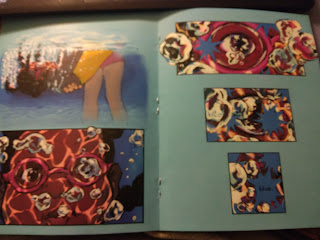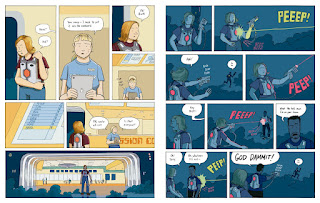Dunk, by Meg Selkey. This short comic is heavy on color and production values, but it pays off because of its emotional heft. Two girls are playing in a pool when one suggests a game of "dunk": one cradles the other, who must guess what color the other girl is thinking. If she gets it wrong, then she gets submerged (dunked!) in the water. The panels where the girl is underwater, gazing upward through her goggles and experiencing the sheer, visceral quality of light through water while holding her breath, is at once thrilling and frightening. This was the desired effect, and the comic ends with her hooked, asking for another color.
Hoy No Circula, by Mercedes Campos Lopez. Campos usually writes YA mystery stories, but she's quite adept at writing journalistic comics as well. This is a clear and even-handed explanation of a particular problem (air pollution in Mexico City), a seemingly sensible policy (restricting the number of cars on the street on a given day), and how that policy actually makes things worse. Campos notes that this was a surface-level solution to a much more complex problem whose roots include government and police corruption. (For example, plenty of cops were happy to take bribes from those driving on forbidden days rather than impound their vehicles, which would actually help the problem.) From the standpoint of graphic design alone, this is a really attractively-assembled minicomic; with an image per page and attractive lettering, it draws the reader into getting a lot of information without it feeling like medicine. Campos writes it much like one of her mystery stories: there's a dangling bit of information that the reader can't help but be curious about. Campos is clearly passionate about the subject but never stoops to polemic, adding just enough distance to let the reader sift through the evidence on their own. This reminds me a lot of how Dan Nott approaches this sort of thing in an almost Socratic fashion.
Mirror Neuron No. 2, by Ivy Lynn Allie. Allie's harsh, funny slice-of-life stories have quickly vaulted her into the upper tier of CCS grads, especially as her confidence in her line has grown. She's staking out her own territory, to be sure, but it's the kind of thing that Sean Knickerbocker, Tillie Walden, and especially Dakota McFadzean do so well. Allie conjures up sad, ugly, and desperate lives where rewards are few and justice isn't always fair. Her adaptation of Hans Christian Anderson's "The Tinderbox" is somehow even more fucked-up than the original. The original concerns a soldier who retrieves a tinderbox for a witch and gets fortunes from three magical dogs. He then decides to kill the witch and take the tinderbox. He becomes nouveau riche until he spends all his money, then strikes the tinderbox, summoning one of the dogs to do his bidding. He has them get more money from their magical tree. Eventually, he's smitten with a princess and has the dog take them on a magical nighttime journey. The princess' family tracks him down and he's sentenced to death, but manages to get his hands on the tinderbox before he's hung. He's rescued, gets the princess, and kills everyone else.
Allie seizes on the one obvious aspect of this story without any kind of moral: it's a young man's revenge fantasy. So she alters certain details to remove any doubt that its protagonist has no redeeming qualities at all; indeed, he's the personification of self-gratification, narcissism, misogyny, greed, and cruelty. He's a fisherman asked by a kind woman to retrieve the tinderbox. She says it's sentimental and he doesn't believe her, so he kills her. When he summons the dog for the first time, it gets him money by robbing and setting the local bank on fire. The dog's very presence causes a trail of plague. He has a memorable dream night with the wealthy young woman, but when she rejects him in the light of day, he has the dog kill her and her fiance. When the authorities close in, he simply has the dog kill them and he becomes governor. He is never punished for his actions; why should he be? He is the personification of the patriarchy, skating by and never seeing the consequences of his own actions. All except one: he leads a love impoverished of love and friendship, of having relationships not mediated by power or money. Allie's cartooning is extremely confident here for a number of spectacular and violent setpieces that add the power necessary to really make this story land.
The "Intermission" section points to the versatility of this one-woman anthology format for Allie, as she's able to do some sillier stories like "The Thin Orange Line," about a maverick public works guy who's fired for fixing potholes out of his jurisdiction; his response, of course, is to become a pothole vigilante. There's also some amusing out-of-context overheard bits of weirdness that speak to Allie's overall versatility. The framing device of a desolate rest-stop is an apt metaphor for these betwixt-and-between pieces.
"I'll think about it" is the flipside to the "Tinderbox" story in terms of theme. If the latter is about revenge for a masculine sense of being aggrieved, then this story reflects the sad reality of a lack of imagination. Offered a chance to go with his girlfriend on an adventure and a new life in England, the protagonist instead clings to the sad fantasy of success at a floundering video game company. This is pounded home by a pathetic laser tag company team-building event. Even this bit of potential testosterone-boosting, gun-toting fun is subverted at every turn by confusion, a lack of enthusiasm by some, and irrational enthusiasm by others. The scene where the desperate boss, proud of providing pizza for his employees, is turned down by the protagonist because he already ate, is everything the reader needs to know about this situation. The defeatist ending, where the protagonist simply goes home early, points to an interesting structural decision on Allie's part: the real climax of the story is when after his girlfriend says that there are game studios in London, he replies, "I'll think about it." He's already made his decision, he regrets it, but there's a sense in which there's no going back. He's bought into his own bullshit too much at this point, even as he gets a dose of reality in the hilariously awful team-building exercise. It's a wrecking ball every bit as devastating as the events of "The Tinderbox," told with restraint and a dark, acidic wit. This wit is at the essence of all of Allie's work.








No comments:
Post a Comment